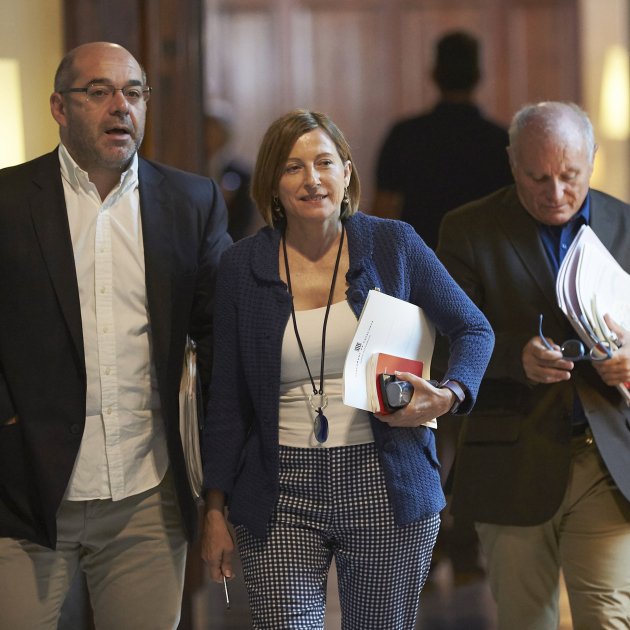The pro-independence parties, JxSí (Together for Yes) and CUP (Popular Unity Candidacy), fear that the Spanish government might try to suspend this Wednesday the Board of the Catalan Parliament ahead of the debate on the bill for the Referendum Law in order to prevent the approval of the text in tomorrow's plenary assembly, El Nacional has learned. This suspension would be justified by a new interlocutory order for the enforcement of a 2015 judgement by the Constitutional Court to block any action related to the independence process.
The Board has not formally started processing the proposed Referendum Law today to avoid the Constitutional Court being able to act against the project. It is expected than, in tomorrow's plenary assembly, JxSí and CUP will call on article 81.3 of the Regulations to ask for a change in the agenda to include the debate on this bill. It will be the Board that will have to admit the bill for consideration.
The president of the Catalan Parliament, Carme Forcadell, already has two lawsuits open against her from the Public Prosecutors' Office before the Supreme Court of Justice of Catalonia for allowing the vote on the conclusions of the Constituent Process Study Commission and the vote on the resolutions related to the referendum, which also motivated a lawsuit against the rest of members of the Board who voted for it to enter into consideration.
When the Board accepts this bill for inclusion in the agenda, the Constitutional Court could act ex-officio, based on the reform to the law that regulates its functioning and contemplates the possibility of direct intervention to guarantee compliance with its resolutions. This could mean anything from from a warning to Forcadell to suspending her and the rest of relevant members of the Board.
International law
From JxSí, Marta Rovira said this Tuesday that the Parliament will use all the tools at its disposal, including international law, to guarantee that the plenary assembly takes place.
The Constitutional Court has publicly shown its reluctance to apply article 92 of the law governing its actions, which could force the public prosecutor to push for the court to act through an interlocutory order.
In any case, the high court is in ordinary session from today until Thursday, so any action, whichever path is chosen, can be taken immediately. It could even be communicated by email. Opposition parties have already announced that they will use all the means they have in the Parliament to delay the debate, which would give the state time to intervene.
After a potential suspension, the Board could end up in the control of the second vice-president, José María Saavedra, of Ciudadanos (Citizens, an anti-independence party), unless the president and the rest of members of the Board affected by the suspension decide to ignore the order. In that case, they could resort to the system of fines, from 3,000 to 30,000 euros.
